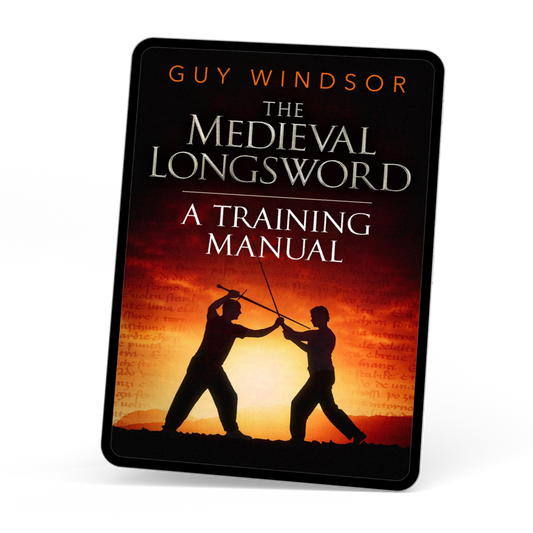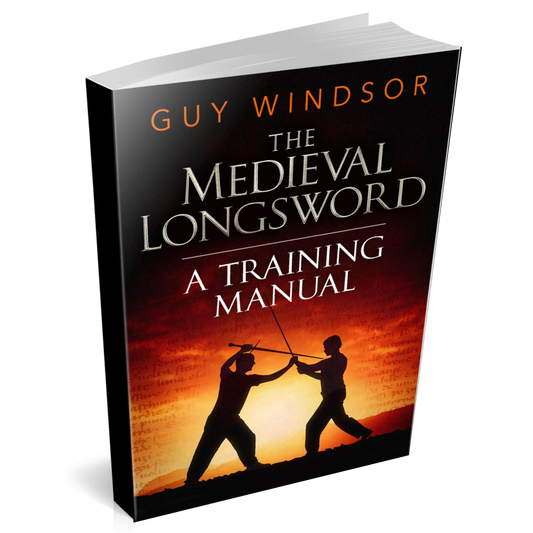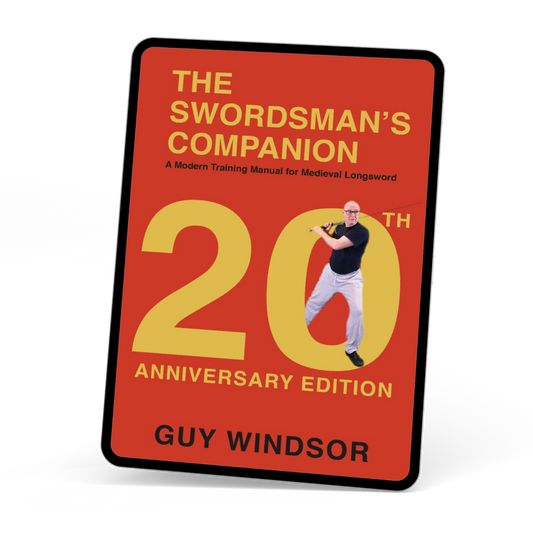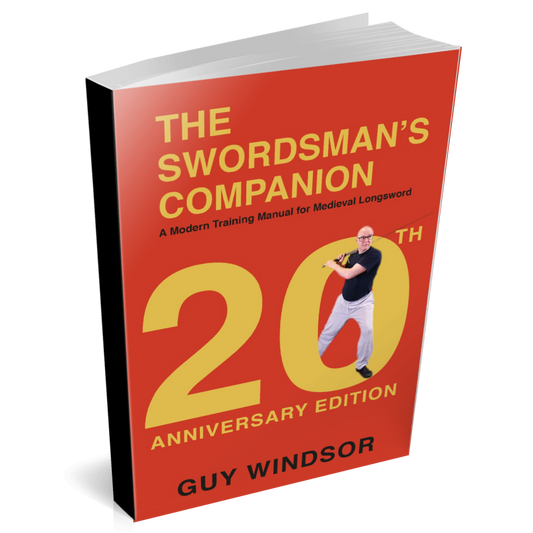
Episode 156 Bringing Italo-Hungarian Sabre to Taiwan, with Huang Chun-Yi
Share
You can also support the show at Patreon.com/TheSwordGuy Patrons get access to the episode transcriptions as they are produced, the opportunity to suggest questions for upcoming guests, and even some outtakes from the interviews. Join us!
Huang Chun-Yi is an instructor of classical and military sabre at Lionheart Historical European Swordsmanship in Taipei, Taiwan. She also blogs in Chinese at travelingswordslady.wordpress.com. Chun-Yi’s club is the only one in Taiwan that practises classical sabre, and we talk about what drew Chun-Yi to the Italo-Hungarian sabre, over the longsword or rapier.
This is the sabre duel from Potop (The Deluge) that we discuss: https://www.youtube.com/watch?v=gP98CcasA-E
We chat about the European historical martial arts scene in Taiwan, and you might be surprised to hear that it’s a small, but thriving community, with an annual event and several clubs.
We also talk about weightlifting, travel, cats and Moomins.

Transcript
Guy Windsor: I'm here today with Huang Chun-Yi who is an instructor of classical and military sabre at Lionheart Historical European Swordsmanship in Taipei, Taiwan. She also blogs in Chinese at travelingswordslady.wordpress.com. So without further ado, Chun-Yi, welcome to the show.
Huang Chun-Yi: A pleasure to be here.
Guy Windsor: Thanks. Am I right in thinking you are actually in Taipei?
Huang Chun-Yi: Actually, I'm in just the middle of Taipei and our club is in Neihu. It is part of Taipei and in Taiwan we have several clubs in Taipei and we are the only one that practices the classical sabre as far as I know.
Guy Windsor: Okay. And you are actually the first person on this show from Taiwan, so it's nice. You are representing the entire country of Taiwan to the rest of the world. No pressure. Okay, So how did you get started with historical martial arts?
Huang Chun-Yi: Oh, for me, actually, I really like to see movie and literature just like others. And I mainly like The Lord of the Rings and one of the characters, they're called Aragorn.
Guy Windsor: Aragorn.
Huang Chun-Yi: Yeah. He's my favourite one. And he's very handsome and look really cool with his Andúril.
Guy Windsor: Okay, so you're an Aragorn fangirl? Excellent, I think you're not alone in that. There's, there's quite a few people out there. Okay so having seen Aragorn in the movies, how did you get into actually swinging swords yourself?
Huang Chun-Yi: Oh, actually, when I really get into swordsmanship and actually it’s from the movie, The Duellists. Do you know the movie?
Guy Windsor: Oh, yeah, yeah.
Huang Chun-Yi: Yeah, yeah. And they have several scenes of the sword fighting from the cavalry charge and the smallsword. And also the sabre on foot. So this is fascinating, you know.
Guy Windsor: Yeah. They are fantastic fights. They're such good sword fights. Some of the best sword fights in any movies, ever, I think.
Huang Chun-Yi: You know, this is really realistic and also the engagement and the thrust is very accurate.
Guy Windsor: Yeah.
Huang Chun-Yi: And Potop, the Polish movie.
Guy Windsor: I've not seen that.
Huang Chun-Yi: No actually it is on YouTube. You can just go ahead and Google it. And there is the two captains and one with the sabre. He keep the engagement and it's really fascinating and I really like the scenes.
Guy Windsor: Okay. So what's the name of that film again? How do you how do you spell it? So I can look it up.
Huang Chun-Yi: Oh, you mean the movie Potop?
Guy Windsor: Okay. I will find it and I'll put a link in the show notes so people can go see it. Okay. So again, movies. But was there a sword club local to you that you could just go and join or did you have to start something?
Huang Chun-Yi: No, no, no. There is no club. And when I was in university, I started from sport fencing. And also I read sources I found online. You know there is the website by Matt Easton. And there are lots of good sources, also the Wiktenauer, so I started from there and read those sources myself and tried trying to recreate the old martial art. But it is just the beginning, you know? Everything is new and everything is usual and is quite new for me. So I had to learn from the sport fencing club with the coach then and probably at the same time when I was in University in 2014, one of my friends I met online and he started in the Czech Republic. He owns a fencing school in Prague and they mainly do the Italian sabre so and he introduced it to me. So actually, the Italian sabre is the leading edge of the Italo-Hungarian sabre. So I started to learn from him. And he came to Taiwan so I can learn with him.
Guy Windsor: Right. He went to Taiwan from the Czech Republic to teach you some sabre. Fantastic.
Huang Chun-Yi: Yes. Okay. This is just my chance. And for me, the Italian sabre is really fun with the engagement and also the application of the thrust.
Guy Windsor: Yeah.
Huang Chun-Yi: And in sabre sometimes we will think it is only for cuts. But actually Italian sabre we mainly start from the thrust then continues with the cut. So actually there are multiple ways to attack and also to defend. I think it’s really fun.
Guy Windsor: All right. So are you mostly studying Italian sabre, or Polish sabre or Hungarian sabre? There's quite a lot of different styles.
Huang Chun-Yi: So yeah, yeah. So for me actually in particular, we are most for the Italo-Hungarian. It is from the Italian Sabre and the Czech Republic was one of the region in the Austro-Hungarian Empire and there are lots of officers in the empire and they went to the new Vienna state nowadays and they learned sabre from Barbasetti, whose master was Radaelli, who was Italian.
Guy Windsor: Yeah so you’ve got Radaelli and Barbasetti and then and then a lot of the Austro-Hungarian officers were learning Barbasetti’s style.
Huang Chun-Yi: Yeah. So that’s why we called it Italo-Hungarian sabre. Yeah.
Guy Windsor: Okay. So when most people think historical martial arts, they're thinking longswords or maybe rapiers. And the sabre over the last ten years or so has become a lot more popular. And now I love sabre. And I started out doing sabre in sport fencing back in the eighties. And yeah, I've been teaching 18th century military sabre off and on since forever. So you're in good company. You're talking to a fellow sabreur, but the wider historical martial arts field is often very kind of narrowly focussed on like longsword or rapier or something like that. So why are you particularly drawn to the sabre?
Huang Chun-Yi: Oh, for me, to be honest, I actually start from longsword. But I still want to do something one handed so I can have my left hand so I can do other application, like in cavalry, you still have your left hand to control your horse or also have the pistol in hand. So this is why I like a one handed weapon.
Guy Windsor: Okay. And longsword and sabre, they're sufficiently different that they don't confuse each other.
Huang Chun-Yi: Yes.
Guy Windsor: Okay. So I'm guessing that most of the people listening don't really know anything about what the historical martial arts situation is like in Taiwan. So could you just give us some idea of what it's like, how many clubs there are, what kind of events you do, that sort of thing?
Huang Chun-Yi: Actually now we have several new clubs around Taiwan and also we practice a variety of different disciplines. And I think there is the new one in Hsinchu and they focus on more like Marozzo, longsword, and I think they do practice side sword. And there are two new clubs in Taipei and one of them practice the British sabre. And another one I forgot, which is but I think it's longsword and there is several in Taichung and they practice mainly German longsword and they are separate salles. And also we have some competition annually and so make some exchanges.
Guy Windsor: Okay.
Huang Chun-Yi: And yeah, so it is a different martial art background from the Chinese martial arts or Japanese martial arts, and even Philippine martial art because of the historical background in Taiwan.
Guy Windsor: Yeah that makes a lot of sense. So it was you that started Lionheart Historical European Swordsmanship, correct? That was that was your club that you started. So was that the first historical martial arts club in in the whole of Taiwan or did somebody get there before you?
Huang Chun-Yi: Actually I think there may be some others but I don’t know. I would not say I'm the first one. Maybe, I don't know.
Guy Windsor: So it sounds like Taiwan has a thriving historical martial arts scene with several different weapons practiced in various different clubs in different cities, which is fantastic. So I have to ask, where do you guys hang out online? Because I've never seen any of this activity. Partly because I don’t read Chinese, unfortunately. So I'm guessing you do most of your online interaction in Chinese, correct?
Huang Chun-Yi: Oh, yes. Actually, we do appear in HEMA United. And for me, for myself I'm in the military sabre and but for us, I don't know, actually I don't know about it. We mostly meet in person. We don’t share a lot online.
Guy Windsor: So it's mostly in real life rather than online kind of community in Taiwan. Interesting.
Huang Chun-Yi: Because it is a relatively small sport. And in Taiwan it is primarily the Chinese martial arts and Japanese martial arts. And they have lots of people to practice.
Guy Windsor: I mean, that's not unreasonable. I mean, you know, China is right next door and Japan isn’t that far away. So do you have like regular events in Taiwan?
Huang Chun-Yi: A regular event? Yes, we do have Clash of Steel.
Guy Windsor: That's a great name.
Huang Chun-Yi: It actually is a new competition and we also have a sabre workshop and I do teach in the Clash of Steel.
Guy Windsor: Okay. Yeah.
Huang Chun-Yi: We would really like to have some other mixed weapon event and there are several small events. I think that it is very private sometimes.
Guy Windsor: So tell us a bit more about Clash of Steel. So how often do you run it and how big does it get? Where do you hold it? That kind of thing.
Huang Chun-Yi: The Clash of Steel are held in Taipei and they are run by the Vor & Nach society.
Guy Windsor: So there's a historical martial arts club called Vor & Nach in Taipei. They run Clash of Steel. Is it once a year?
Huang Chun-Yi: It is annual.
Guy Windsor: When is it?
Huang Chun-Yi: I think this year is around June.
Guy Windsor: June. Okay. So it's run by this Vor & Nach, I'm assuming German longsword club because Vor and Nach are German longsword terms. But they're open to having you coming along teaching some civilised Italo-Hungarian sabre stuff.
Huang Chun-Yi: Yeah. Actually I think I teach in previous years. I mainly teach Italian sabre and smallsword.
Guy Windsor: Oh you're a smallsword person as well. I love smallsword. I started with French foil, the first weapons I ever studied was French foil. I love it.
Huang Chun-Yi: Yeah. Actually the laws are basic from the French foil you can even still apply in the sabre.
Guy Windsor: So what's your favourite smallsword historical source?
Huang Chun-Yi: Hmm. Of course Angelo.
Guy Windsor: Yeah, that's fair. Do you read French at all or just English?
Huang Chun-Yi: Uh, actually, no.
Guy Windsor: So Angelo is a good choice because it's a translation of the French, the original French, but done by the author's son while the author was still alive and published in London. So it's like this is like the most authoritative translation possible into English of this seminal source, the School of Fencing.
Huang Chun-Yi: Yeah, it is one of the advantages of the English sources. Also Barbasetti did write in English?
Guy Windsor: Did he?
Huang Chun-Yi: Yeah. You can just Google online and find the Wiki for these sources and also PDF.
Guy Windsor: Okay. It is very helpful to find sources written in English. I mean, if only Fiore had written in English, my life would have been a lot easier.
Huang Chun-Yi: Actually, I do love Fiore, but I don’t study it much. I do read your books.
Guy Windsor: Oh really? That’s nice to hear that my books have made it all the way out to Taiwan, that's fantastic. So we have the wider historical martial arts world, and every country seems to have its own particular historical martial arts community, which has things in common with the wider community, but also its own specific sort of approaches and ways of organizing, that sort of thing. So what do you think the Taiwanese historical martial arts scene can teach the rest of the world?
Huang Chun-Yi: I would say that I think we are really open minded and as I have said, we exchange a lot with other martial arts and I think we do have the mix within competition and it's also in the annual event and I think is encouragement for others to meet with others and to do the different kinds of research between the other martial arts and compare with each other’s. And I think there are also kind of similarity and the differences between in martial arts. But for HEMA is still unclear and has stereotypes for other who don't really know what it is. And yeah, so I think we still need to work a lot on the promotion because and I think HEMA is generally like, longsword, you know, HEMA is just longsword, and is still only for performance or for show. And actually we do have the competition and it's kind of a combat sport. It developed into a combat sport, not only for show. And so we still need more exposure, but I think we are we are already growing bigger and bigger. I think we just need more time. And the most advantage for us is the different martial arts.
Guy Windsor: Okay. So you have like strong ties with the wider Asian martial arts community. I always cultivated that myself and it is super useful. So I've trained in karate and kung fu and jiu jitsu, various other Asian martial arts, and I find that if I'm stuck on a problem in my research, nowadays, there are a lot more people who are highly experienced and can be helpful. But back in the old days, so 15/20 years ago, the most useful people to me in my interpretation work were martial arts instructors from other martial arts like kung fu or tai chi or whatever. So yeah, cultivating strong ties with the wider martial arts community is a very good idea.
Huang Chun-Yi: Yeah. And one of the one of the very interesting things I found that, because one of my friends is from the Tankendo and Jūkendō. Tanken and Jūken. And Jūken is Japanese bayonet. And actually it is developed from the French foil fencing and also the French sabre. And they developed their training methods into the Tankendo training methods. So actually there is a lot of training similarity for the European martial art and the Japanese Jūkendō.
Guy Windsor: Because in the late 19th century the Japanese brought over French instructors for I think it was foil, which they didn't really like; Sabre, which they adapted into a kind of much more Japanese version of sabre fencing using basically a katana in one hand. And then they have the bayonet fencing which was its own separate thing, which they of course they Japanese-ified it, they gave it their own particular twist.
Huang Chun-Yi: I would say adopted the training method from the French foil, like when you give the opening and they do a simple thrust and if you parry and they will do it disengagement. Just like that, it is a really modernised training method that you can see in the pro fencing nowadays actually.
Guy Windsor: Yeah. It's kind of fascinating to me that the bayonet stuff they took it from the French who were I think the worst at it in all of Europe. I think the Swedish method was probably better and the Prussian method was way better, but the Japanese, they picked the French. Why the French? I don't know.
Huang Chun-Yi: Yeah, this is really interesting, the linkage between the different styles of martial arts.
Guy Windsor: Now, so am I right thinking you are also a strength training person? Okay. Tell us tell us a bit about it as one thing that I am really keen on is the additional training around the swords that enables you to do the swords better. And I know my camera’s turned on and so you can see over there there's a whole pile of kettlebells on the floor. And there's like small hand weights over there, you know, I do all that stuff myself.
Huang Chun-Yi: That’s really good. I saw the club.
Guy Windsor: So what kind of strength training do you do?
Huang Chun-Yi: I do mainly weightlifting. Actually, weightlifting, I do this competition very often, including the snatch and clean and jerk.
Guy Windsor: Oh, wow. So you're doing the Olympic weightlifting.
Huang Chun-Yi: Yeah, yeah, yeah, yeah. Actually, I do this and it's a really helpful for the explosiveness and the speed and also I would say I promote, I don’t teach.
Guy Windsor: Okay, you promote it, you don’t teach it.
Huang Chun-Yi: Yeah. To be precise, yeah I promote. Actually for most people fencing is very safe as long as you do correct movement, but when you speed up the loading will increase and will cause the fatigue. These will be the risks for injury. And also sport performance is like a pyramid and the moving safe and functional training is at the bottom and the sport performance is on the top. So you have to have a very good basic of the functional training then.
Guy Windsor: Yeah, so you have functional training at the bottom, and then maybe more specific strength training above it and then maybe stamina training above that. And then you've got your sport performance on the top. Yeah, that's exactly how I see it.
Huang Chun-Yi: And of course also I have the job day job and we spend a lot of time sitting and doing things with our front side. So this is the weakness of our back muscles. And this will impact the movement when we are doing the sport because of the imbalance, and imbalance will lead to injury. So I think the performance will be not so good if, if your basics are not really good. So you have to fix the problem. And for me also, I'm a small female. This is a really important for me to build the muscle mass to train with a weapon of a certain weight.
Guy Windsor: Yeah. The sabres that you’re using, they are maybe about a kilo.
Huang Chun-Yi: Yeah, yeah, yeah. It is around 700 grams for Italian sabre. So strength training is the best way for me. And of course, for the sports performance, as I have mentioned. I do sport fencing. So I do some sport fencing tournaments too, the classical fencing training because and we know, in the 19th century, even in the Renaissance times, you can see there are some fencers who trained in the gymnasium. They are all linked.
Guy Windsor: Yeah. So I interviewed Neil Stephenson on your show last year. He talked quite a lot about using Indian clubs because they're basically recreating kind of 19th century combatives, so Bartitsu and Sabre and they're also doing Indian clubs because they were very popular in London in the late 19th century. So you do the snatch and the clean and jerk.
Huang Chun-Yi: Yes. Mostly. And also some accessory work like agility and speed training with the movement. And also I do some kettlebells. Kettlebells are a really good tool for training.
Guy Windsor: So can I ask what is your personal best for the clean and jerk?
Huang Chun-Yi: My personal best. Actually, I'm not professional, so my personal best for the snatch, I think is around 40 kilos.
Guy Windsor: Wow, that’s quite a lot. As you describe yourself as a small female. And I have to say that a 40 kilo snatch is not bad at all. Wow. I don't think I could do it.
Huang Chun-Yi: You know, you just need to do practice. And I think the clean I have done 50 kilos.
Guy Windsor: 50 kilos for a clean and jerk.
Huang Chun-Yi: But this is just the best, you know.
Guy Windsor: Like that moment where you've got it up to your chest and then you have to kind of drop down into a squat and shove it over your head and then stand up. You're standing up with 50 kilos hanging over your head. That's quite impressive.
Huang Chun-Yi: Well, you just need some core strength.
Guy Windsor: So time to take you've been properly taught how to do that. You’ve gone to lessons. Where do you train?
Huang Chun-Yi: Actually I do learn from a coach and I train in the course space and they have the class. The club is in Taipei. Yeah, but for me, I do train with them sometimes but also now I’m quite busy so I train myself. But you just need some time to learn the correct the movements so you can just practice yourself.
Guy Windsor: Do you just drop it onto the floor or do you lower it back down?
Huang Chun-Yi: No, I drop to the floor because it's quite heavy. Because maybe sometimes I can jump on back when the weight is not much and to do the second rep and stand up.
Guy Windsor: Yeah. I've never been good at that kind of weightlifting stuff so I'm super impressed that you can clean and jerk 50 kilos. I don't want to fight you.
Huang Chun-Yi: I would say, you just need a good coach because there is a skill. And the skill is using your whole body, not just using your arms to pull. So the power is actually from the legs and you push to the ground and just use the momentum.
Guy Windsor: I understand it in theory and I have done a little bit in practice but it's super hard and it scared the crap out of me holding a heavy weight over my head like that. Now I'm much happier with sharp swords. Sharp swords don’t scare me so much. But big heavy weights: very frightening. Okay. So I do a bit of research on all of my guests. And one of the things I came across when looking into you and your background and interests is cats. Lots of cats. Tell me about the cats.
Huang Chun-Yi: Cats. Okay. To be honest, I only have two cats and there are other cats down the street, though. The tabby cat is my boyfriend's cat. And my cat is the one with the white fur called Nike. And she really like to cuddle with me. And she will get up really early, like three or 4 a.m. and she wants to pet, you know, at 3 or 4 a.m.
Guy Windsor: Right. When my kids were little, sometimes one of my children would come in at three or four a.m., because they wanted to cuddle, and that's fine. But a cat, I wouldn't have the patience for.
Huang Chun-Yi: And the other one is the tabby cat. And he was a stray cat. And before I had a cat, I actually had a dog and the dog really cared about the stray cat. And the cat was really slow. And the tabby cat we call Panpan, is from the bunch of cats. And I think is after when the dog passed away and he jumped in my window and used to stay.
Guy Windsor: When my grandfather was 95, I think, and it was after my grandmother died. So he was alone in the house in his house in London, and he got adopted by a cat that just appeared and just, you know, he would feed the cat and the cat would basically just stay with him until eventually he moved into a nursing home and. But yeah, this cat just appeared out of nowhere, sort of looked after him. And then when he went away, the cat disappeared. It's extraordinary. It's like they are magical creatures somehow.
Huang Chun-Yi: When the cats chooses disappear they may know. They may pass away sometimes. One of the most interesting is the tabby, Panpan. I will call him Panpan. And he really likes to eat shrimp and in Mandarin we call it 虾 (Xiā). So it is a word he knows. So every time when we ask him, “Do you want to eat a shrimp?” and he will start to “ah ah ah”. So shrimp is one of the words he knows.
Guy Windsor: You will send me pictures of your cats to put in the show notes, right? Good.
Huang Chun-Yi: Yeah, of course. If you want more cat pictures you can find them on my account.
Guy Windsor: That's why I came across the idea that you were into cats.
Huang Chun-Yi: Yeah. I really like to take some photos on those streets, so I do take a lot of cat photos.
Guy Windsor: Okay, so now tell us a little bit about your blog, Travelling Swords Lady. So there's travelling and there's swords and I assume the travelling swords lady is you. I'm assuming you like to travel?
Huang Chun-Yi: Actually, yes, I do see some chance to travel and I think it was 2018 or 17, I taught in a British event.
Guy Windsor: The one organized by Fran?
Huang Chun-Yi: Yeah. That event. I really love to travel and my family run a travel agency.
Guy Windsor: Very handy. If you like to travel, having a travel agency be your family business is very helpful. So, where have you been?
Huang Chun-Yi: I have been to Prague and recently to Japan. And mostly I spend more time in Japan.
Guy Windsor: You're born in Japan?
Huang Chun-Yi: I was born in Japan.
Guy Windsor: Do you speak Japanese?
Huang Chun-Yi: A native speaker, but it has been a long time.
Guy Windsor: So you speak Japanese and Mandarin and English. That's a pretty good mix. So where would you like to travel the most? Somewhere you haven't been. If you had the choice, where would you go?
Huang Chun-Yi: Maybe Finland.
Guy Windsor: I can recommend Finland very highly.
Huang Chun-Yi: Maybe Finland and Sweden.
Guy Windsor: I'm going there next week.
Huang Chun-Yi: I really like Moomins.
Guy Windsor: Okay. My favourite coffee mug is a Moomin mug. Actually, if you get the chance, if you like Moomins, if you go to Finland, it is totally worth going to Moominworld. Or Moomin Land, which is just outside Turku. So a couple of hundred kilometres west of Helsinki. They have recreated the Moominvalley.
Huang Chun-Yi: Okay. I will try to remember.
Guy Windsor: Right. So all the buildings are there and they have all these all these actors running around in Moomin outfits. And there's Little My, I think they call in English the character, with that hair that sticks out at the top and is very naughty. So she like she like runs all these activities for the kids and stuff is absolutely fantastic. I took my children there when they were about, I think four and six, something like that. And they absolutely loved it. It's very calm. It's very quiet. It's the only sort of theme park I've ever been in where there's a great big rest area with like hammocks and beanbags so that when the kids are tired, you can all just kind of snuggle up and have a nap. I mean, it is it most Finnish place you can imagine. It's fantastic. So, yes. Moomin World, definitely go. So what draws you to Finland?
Huang Chun-Yi: I will add it to my list. Moominvalley. Okay. Moomin’s part of the reason, of course, before I practiced sabre, I really got into the sidesword.
Guy Windsor: Ilkka.
Huang Chun-Yi: Ilkka Hartikainen. I'm sorry, I don't practice. And he really teaches you very well.
Guy Windsor: Okay. So you want to go to Finland to practice sidesword with Ilkka Hartikainen.
Huang Chun-Yi: Yeah, to practice. Around 2015 I went to Singapore to train with them and the club there.
Guy Windsor: So you went and went to Singapore to study Side Sword with Ilkka but you didn't come to Singapore to study longsword with me. I am heartbroken. It is terrible. You like Ilkka more than you like me! Oh no!
Huang Chun-Yi: Sorry. I already changed from the longsword to the totally one-handed.
Guy Windsor: I know. Okay, so there's a couple of questions I ask all of my guests and one of which is what is the best idea you haven't acted on yet?
Huang Chun-Yi: Mm. Translation. And there are several. I think in the Mandarin speaking word, the disadvantage is the language. And for most people reading English or reading other language sources is very difficult. And sometimes we even, when we want to research on YouTube or Google and we just don't know the key words. So I want to translate the sources into Mandarin.
Guy Windsor: It’s really hard to do. But if you're translating an English source, that’s one thing. But if you’re translating an Italian source or French or whatever.
Huang Chun-Yi: Might be, might be. I would like to try. Yeah, I would love to try because actually I know some friends who do speak Italian and French.
Guy Windsor: So you'd like to translate that. If you had all the time in the world, what source would you translate into Mandarin first?
Huang Chun-Yi: I would say maybe Barbasetti and the Radaelli sources. Because it's much easier to grab for many in the sport fencing community, it is really quite easy to dip into these kind of sources. And I think when they know the sources and other people's, because they do write something in Mandarin, I can use it to do others.
Guy Windsor: So the great idea that you haven't acted on yet would be to translate Barbasetti into Mandarin. That would be quite an accomplishment.
Huang Chun-Yi: Yeah. Yes. Actually I would like to draw in some of my notes, because I do have some notes. I do drawings but my drawings are really awful.
Guy Windsor: You can get someone to make the drawings for you. That's what I do. I can’t draw either, so when I need a drawing I hire somebody. There are lots of people out there who can draw really well. Okay. Well I think it will be a brilliant idea to get some of our sources translated into Mandarin because it's an enormous market for people who, there are maybe a billion people. A billion and a half who can read Mandarin. Yeah.
Huang Chun-Yi: I think the men in China, and there are some south eastern clubs, they can read Mandarin.
Guy Windsor: The market is huge. So my last question. Somebody gives you $1,000,000 or similar large sum of money to spend improving historical martial arts worldwide. How would you spend the money?
Huang Chun-Yi: It is actually this is a really tough question. I do think about to do an academic scholarship and also have the, you know, an academic conference in Asia, just Asia region, because we already have the conference and some kind of academic scholarship in Europe. So I think we need to have the one in Asia, especially in the Asia region. We don't have the historical martial arts conference here. So we in Taiwan, we do have the university, you have the historical project and historical master, they study and do the research on the military history. So I think this is really quite important to enhance the academic way and the academic research method to strengthen the historical martial arts scene, and not just the martial arts sport or just swinging the sword, and we do have some context or content to do lots of the research and combine with the military history and also the military culture. And also when we study the military culture and we can also know why and how to conduct the duelling code. Also there is the linkage between it. So I think the academic conference is really important. It would cost a lot of money.
Guy Windsor: Okay. So you would initiate a an academic conference in Taipei, perhaps, or somewhere else? And you do it maybe through the university in Taipei. Or you would do it through the university, or perhaps independent?
Huang Chun-Yi: Yeah, I think is we do in the university is the best choice because this is the officially academic way to present a formal conference.
Guy Windsor: Would you sponsor academics to come to it or I mean what do you need the money for?
Huang Chun-Yi: For me I mean invite lots of different kinds of instructor or scholar to do every presentation to start the first step.
Guy Windsor: Yes you get a whole lot of scholars from the wider world and from Taiwan.
Huang Chun-Yi: And I think this is a really good start.
Guy Windsor: Get them all together basically, I guess, to boost the academic side of historical martial arts in Asia. That's an excellent idea.
Huang Chun-Yi: Yes. I think this is the point we sometimes miss in Asia. Sometimes they just look at the competition. But competition is just a small part of the historical martial arts and sometimes that this is just a combat sport, something maybe not real. Okay. Maybe not real and not really accurate for the history. I would say when we revise and I will not use their word “recreate” because it already exists. So I would use the word “revise”. When we revise it we need to we need to do more research on the historical and cultural background and how the people at the time lived their lives and also the ruleset of the city and also the ruleset of the city will affect which weapon they choose or the weapon they made. So I think this
academic way is much more important than the sport.
Guy Windsor: That’s an interesting idea, because also just having it in Asia would attract much more interest from Asian scholars. So it would get the idea of historical martial arts spreading out. Yeah, lovely. I think, well, if I had the money, I would probably give it to you. Thank you so much for joining me today, Chun-Yi, it has been lovely to meet you.




